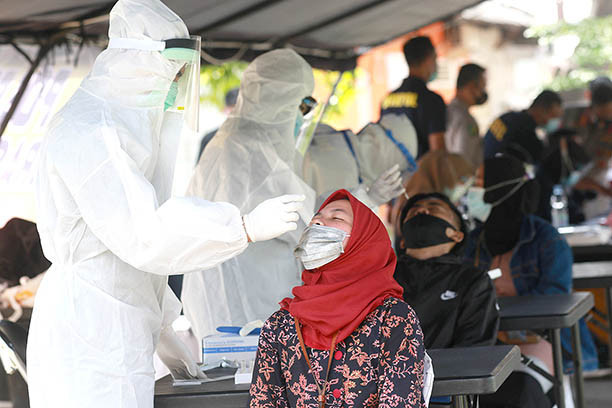Popular Reads
Top Results
Can't find what you're looking for?
View all search resultsPopular Reads
Top Results
Can't find what you're looking for?
View all search resultsPeople asked to raise awareness to tackle Delta variant
The government plans to continue monitoring the Delta COVID-19 variant so it can deliberate strategies and action plans to prevent its spread.
Change text size
Gift Premium Articles
to Anyone
T
he government plans to continue monitoring the Delta COVID-19 variant so it can deliberate strategies and action plans to prevent its spread. The Delta variant has become a serious concern due to its high transmission rate, thus requiring all stakeholders to work together to overcome it.
Since the public activity restrictions (PPKM) were first implemented at the beginning of this year, the number of laboratory checks has been increasing to reach the WHO’s standard testing rate. The genomic sequencing laboratory network under the National Institute of Health Research and Development has been consistently exploring and tracing the pattern of COVID-19 spread. Since the beginning of 2021 up to July 28, Indonesia has reported 3,651 sequencing results to the global database.
Included in the report are the third and fourth variants of the coronavirus that required special attention, namely the Alfa, Beta and Delta variants. “The Delta variant has dominated 86 percent of the specimens that have been sequenced in the last 60 days, which originated in 24 provinces and thus deemed to have been fairly distributed,” Health Ministry spokeswoman for COVID-19, Dr. Siti Nadia Tarmizi, told a live broadcast press meeting recently.
Nadia went on to say that the phenomenon deserved everyone’s attention due to the variant’s high potential to spread. Therefore, to slow the spread of COVID-19, the government plans to strengthen testing and tracing, mainly in packed residential areas. The tracing mechanism will also use the Silacak software system to find the patients’ close contacts. Those who are considered a close contact will be directed to self-isolation and undergo an entry test.
The government has committed to increasing the testing volume from around 300,000 to 500,000 tests daily. Accelerating the vaccination drive to boost immunity is also high on the agenda. Vaccination can decrease the risk of being infected by COVID-19, as well as the risk of dying in the event of contracting it.
Therefore, the government has been increasing vaccine supplies, consistently raising awareness and increasing vaccine availability.
To keep up with the government’s pace, it is hoped that everyone can act responsibly and with awareness to stop the virus by complying with the 3M health protocols, as well as lowering social mobility and avoiding crowds.
On the other side, for those who have been infected or become a close contact, it is expected that they report directly to the local authorities such as the community head or local COVID-19 task force. Infected people must also take a swab test, and if it comes back positive, they are obliged to undergo a self-isolation period. Simultaneously, the local authorities could carry out tracking through their close contacts. Nadia highlighted that this was just the beginning on the personal level.
She added that full cooperation from families and the patients’ close contacts was expected so the health authorities could gain actual information. To this date, daily cases are still high with an average of 40,000 daily cases. Right now, there are no COVID-19-free zones.
Commenting on this, Communication and Information Minister Johnny G. Plate said the government had been monitoring the new virus variant mutation map in Indonesia.
“We are also highlighting the importance of following and practising the health protocols as the best way to prevent further spreading,” he said.










